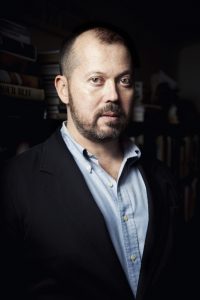The PEN Pod: Practicing Social Solidarity with Alexander Chee

Photo by M. Sharkey
To finish off our first week on The PEN Pod, we spoke to Alexander Chee, the author of several books, including his most recent, How to Write an Autobiographical Novel. His short story, “The Weddings,” is available now on Amazon. He spoke with us about his tips for how to stay focused and keep writing during this moment of crisis, what we can do to support our literary communities, and what he’s reading now.
Why do you think reading and writing literature right now is important?
I think that it’s partly a good chance for all of us to step outside of our normal patterns and consider picking up something that we might not ordinarily pick up or to try and go deeper in some way than we normally do with the pace of our work lives. It’s not anything like a retreat. You might be able to pretend your way into that, and I commend you if you can. I find myself absolutely enraged at what I see as the incompetence of the federal response, so part of what I’m doing is just trying to maintain my own emotional stability as I participate in social distancing, aka, social solidarity.
Do you have any tips for how writers can stay engaged and focused on their writing during this period of anxiety?
It’s really hard. I think that one of the best things that you can do to change your state emotionally is to try to do something physical, whether it’s just stretching out, a few push-ups, or if you’re able to take a walk. I have found it very hard to do my own work currently, but I think the easiest way for me to get back into it always is to just tell myself, “I’m just going to look at this,” to act as if I’m doing something casual, rather than sitting down and thinking, “And now I will do this thing that I never get to do.” There’s some sort of moment that needs to be a little more anonymous for me to access my own ability to write, rather than sitting down as if I’m sitting down to, like, a pipe organ in front of some enormous and invisible audience.
“I find myself absolutely enraged at what I see as the incompetence of the federal response, so part of what I’m doing is just trying to maintain my own emotional stability as I participate in social distancing, aka, social solidarity.”
What can we do in the literary community to support one another?
That’s a really interesting question, and I think it’s something that many of us are coming up against. I think if you are able to spend the money (because a lot of us have seen our incomes just absolutely cratered by this), say, add a subscription to something that you don’t normally subscribe to, which is something that I did this morning, for example. Or consider looking at a bookstore whose events you were going to, and then, even though those events have been canceled, go ahead and order those books from that store. One of the things that is interesting to me about this moment is that we’re seeing how social it all really was and is. We really do participate in these communities, and they do matter to us. They’re part of our intellectual life, they’re part of our livelihoods, and they’re part of how we grow as writers and people.
“We really do participate in these communities, and they do matter to us. They’re part of our intellectual life, they’re part of our livelihoods, and they’re part of how we grow as writers and people.”
What are you reading or watching right now that’s providing some distraction or more context around this whole crisis?
The thing that I’m trying to do right now is to think about some books that I have been wanting to read anyway. I have been very busy the past few years traveling for work in different ways, and this incredible stack of books has built up in my house. I’m looking at Andrew Altschul’s The Gringa, Yan Lianke’s Three Brothers, New Waves by Kevin Nguyen, Luster by Raven Lalani, Olivia Laing’s new essay collection, Funny Weather. I’m also in a period of reading E.M. Forster for my edification and pleasure. It’s been really great to just vanish into this other world, where some of the problems of our current world certainly originated. I’m reading Howard’s End right now, for example, and listening to it on tape, while also reading the biography of E.M. Forster by Wendy Moffat. That’s been really interesting to think about, everything from this novel that he wrote about wealthy liberals trying to help working class people and screwing their lives up in the process, with fatal consequences. And then in the biography, looking at some of what Forster’s thinking was that went into it, as well as his own social background. It’s been a huge pleasure to discover, for example, that E.M. Forster might be the ultimate E.M. Forster character, even as I’m also thinking about how I might try to show solidarity with and help the people that are dear to me.
Send a message to The PEN Pod
We’d like to know what books you’re reading and how you’re staying connected in the literary community. Click here to leave a voicemail for us. Your message could end up on a future episode of this podcast!






